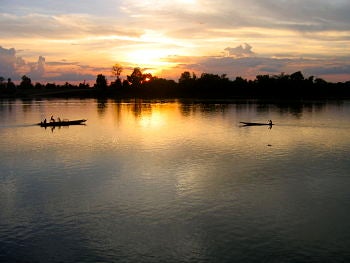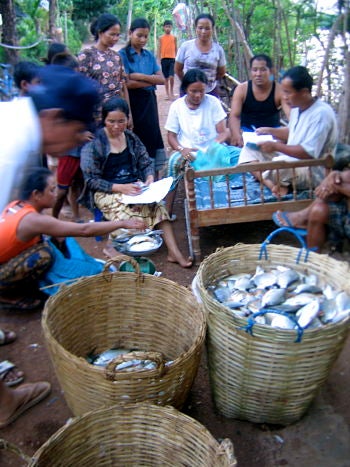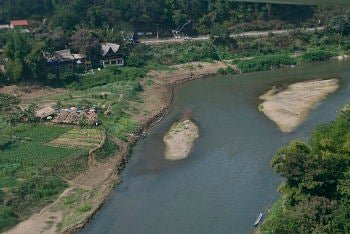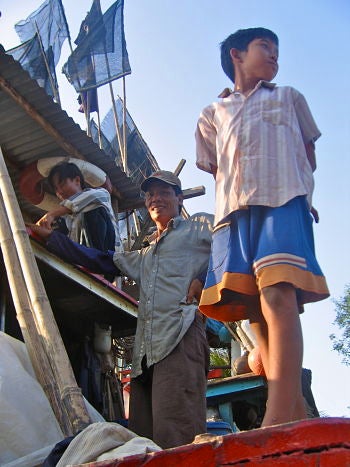
La página que intenta visitar sólo está disponible en inglés. ¡Disculpa!
The page you are about to visit is currently only available in English. Sorry!


A pristine stretch of the Mekong in southern Laos. Credit: Rachel Nuwer
All is not well along the muddy stretches of the Mekong River. The environmental and human rights group, International Rivers, received a shocker earlier this week when a leaked letter revealed that Laos is steamrolling ahead with plans to build a massive dam across the main branch of the Mekong River. In an “egregious breach of trust” Laos has broken an agreement made with neighboring countries Cambodia, Thailand, and Vietnam to defer construction until further studies and discussion could take place, according to a statement made by Ame Trandem, a Mekong campaigner at International Rivers.
Village fish market, southern Laos. Credit: RNuwer
 The controversial project, known as the Xayaburi Dam, has had conservationists and local stakeholders up in arms for months. In October, a Strategic Environmental Assessment, compiled by a team of 25 international scientists, made clear that any dam on the mainstream of the Mekong would represent a “global loss” in biodiversity and jeopardize the livelihoods of nearly 30 million people who live within ten miles of the river’s lower stretches. The dam would almost certainly drive already vanishing species like the Mekong giant catfish to extinction. The annual flooding and nutrient cycles of the river would be “fundamentally disrupted,” according to the report, impacting crop regimes and wreaking havoc on fish breeding and migration.
The controversial project, known as the Xayaburi Dam, has had conservationists and local stakeholders up in arms for months. In October, a Strategic Environmental Assessment, compiled by a team of 25 international scientists, made clear that any dam on the mainstream of the Mekong would represent a “global loss” in biodiversity and jeopardize the livelihoods of nearly 30 million people who live within ten miles of the river’s lower stretches. The dam would almost certainly drive already vanishing species like the Mekong giant catfish to extinction. The annual flooding and nutrient cycles of the river would be “fundamentally disrupted,” according to the report, impacting crop regimes and wreaking havoc on fish breeding and migration.
The leaked letter, written by the Lao government to the Laos-based Xayaburi Power Company, states that the Lao government, “in a spirit of cooperation and working together of all relevant parties,” believes that it has done everything it needs to do in order to clear the project. “Essentially, [the letter] gives the green light to the company to move forward,” says Aviva Imhof, the Interim Executive Director at International Rivers. In a second letter, the Xayaburi Power Company writes to the Electricity Generating Authority of Thailand saying that since the consultation process is complete, they would like to initiate construction.
Rural riverside communities are predicted to suffer losses from the dam. Credit: RNuwer

The river gained a brief reprieve in April when the four Mekong nations met to discuss the pros and cons of building. The meeting was backed by a coalition of 230 NGOs opposed to the plan. Vietnam and Cambodia, the downstream countries most likely to bear the brunt of the dam’s ecological consequences, “made very clear statements expressing concern for more research and consultation,” Imhof says. Vietnam was most strongly opposed and called for a 10-year moratorium on all hydropower projects (Laos has proposed a total of 11 eventual dams). The countries agreed to put the project on ice until further ministerial-level meetings could take place, tentatively scheduled for this November.
Laos hopes to use the dam to boost the country’s economy by exporting much of the anticipated 1,260 MW of dam-generated power. But surreptitiously defying the wishes of its neighbors by proceeding with construction means Laos has joined the ranks of “rogue nations,” Trandem said in her statement. The four Southeast Asian nations are bound by the 1995 Mekong Agreement to hold inter-governmental consultations before tampering with the river, since any upstream actions can have profound downstream consequences. “We think it’s pretty outrageous that Laos is proposing to proceed unilaterally with this project in violation of their international obligations under the Mekong Agreement,” Imhof says. By carrying on in spite of the other member countries' wishes, Laos is violating its obligations under international law.
Vietnamese boat families are completely dependent on the river for their livlihoods. Credit: RNuwer
 But establishing international law and enforcing international law are two entirely different issues. “It’s very difficult to enforce those commitments,” Imhof says. She hopes that regional governments in Vietnam and Cambodia will step up after they’re alerted to Laos’ covert operation. In Thailand—though the country is poised to benefit from construction profits as well reap the largest dam-generated power consumption—local communities are also placing pressure on the government, especially in the country’s northern provinces where livelihood losses will likely be largest.
But establishing international law and enforcing international law are two entirely different issues. “It’s very difficult to enforce those commitments,” Imhof says. She hopes that regional governments in Vietnam and Cambodia will step up after they’re alerted to Laos’ covert operation. In Thailand—though the country is poised to benefit from construction profits as well reap the largest dam-generated power consumption—local communities are also placing pressure on the government, especially in the country’s northern provinces where livelihood losses will likely be largest.
International Rivers also hopes that donors will increase their pressure on the Mekong River Commission, the central organization dedicated to sustainable development in the region. And on the flipside, “Laos is also still a very donor-dependent country,” Imhof says, so country-level donors can do their part to pressure the Lao government directly.
“We’re going to continue to work to ensure that this project and no projects on the mainstream of the Mekong are built,” Imhof says, “because these projects would threaten the river's fisheries and livelihoods of literally millions of people.”